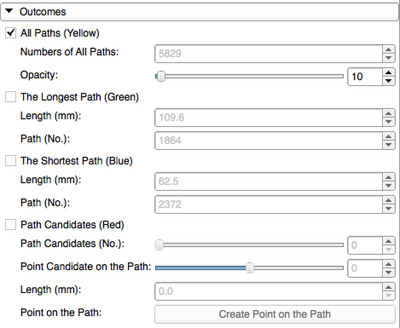Difference between revisions of "Documentation/Nightly/Modules/PercutaneousPathDesigner"
| Line 27: | Line 27: | ||
|[[File:PercutaneousPathDesignerView1.png|360x240px]] | |[[File:PercutaneousPathDesignerView1.png|360x240px]] | ||
|[[File:PercutaneousPathDesignerView2.png|360x240px]] | |[[File:PercutaneousPathDesignerView2.png|360x240px]] | ||
| − | |[[File: | + | |[[File:PercutaneousPathDesignerView6.png|360x340px]] |
|} | |} | ||
{| | {| | ||
|[[File:PercutaneousPathDesignerView3.png|360x240px]] | |[[File:PercutaneousPathDesignerView3.png|360x240px]] | ||
|[[File:PercutaneousPathDesignerView4.png|360x240px]] | |[[File:PercutaneousPathDesignerView4.png|360x240px]] | ||
| − | |[[File: | + | |[[File:PercutaneousPathDesignerView5.png|360x340px]] |
|} | |} | ||
Revision as of 10:38, 25 July 2014
Home < Documentation < Nightly < Modules < PercutaneousPathDesigner
|
For the latest Slicer documentation, visit the read-the-docs. |
Introduction and Acknowledgements
|
This work is supported by NA-MIC, NCIGT, and the Slicer Community. Author: Atsushi Yamada, Shiga University of Medical Science (SUMS), Japan | |||||||
|
Module Description
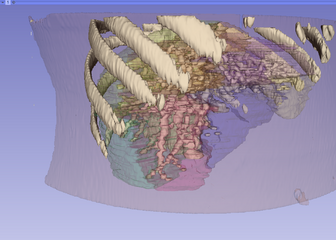
|
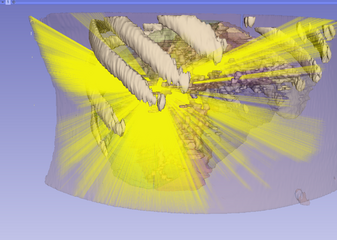
|

|
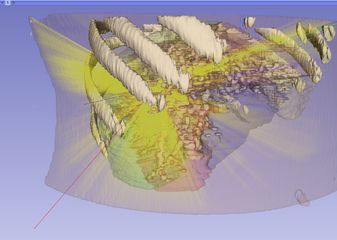
|
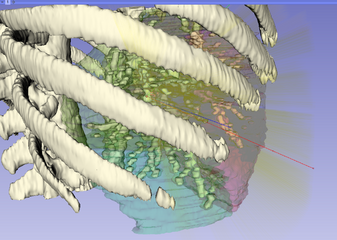
|
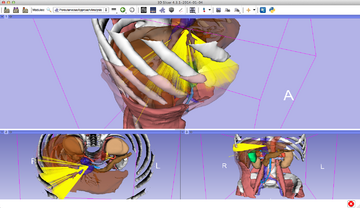
|
PercutaneousPathDesigner is a Slicer4 module designed to display bundles of needle path candidates to avoid blood vessels, bones and specific anatomies and create the path from the bundle. The bundles of path candidates is calculated based on a target point, a skin model and an obstacle model. After the calculation, you can obtain possible trajectories to avoid the obstacles as bundles of path candidates. This bundle expression may help you grasp safety paths easily. Furthermore, it is possible to evaluate the each path on the bundles based on the length and the trajectory comparing with the longest path and the shortest path. The location of the skin entry point of each path can be modified by extending and shrinking the path. The target point and the skin entry point you modified on the selected path could be output as a MarkupsFiducial List. You can clean up the models generated from this module.
Use Cases
PercutaneousPathDesigner is a useful tool for planning needle insertion. Percutaneous thermal ablations including radio frequency, microwave and cryotherapy requires needle trajectories to avoid blood vessels, bones and specific anatomies to reach probes to target around tumors. Needle biopsy also requires safety path to gather multiple tissue. For these cases, this module can help to obtain the path candidates based on the target point, a segmented model of the avoidable region and another segmented model which represents skin entry surface.
Tutorials
N/A
Panels and their use
- Parameters panel
- Target Point requires MarkupsFiducial List created in Markups Module which has only one markup.
- Output Fiducial List requires MarkupsFiducial List created in Markups Module which has no markups.
- Skin Model requires a model which represents a skin, that is, a surface on the needle tips.
- Opacity Slider can change the opacity parameter of the Skin Model selected.
- Obstacle Model requires a model which represents obstacles needle paths should avoid.
- Opacity Slider can change the opacity parameter for the Obstacle Model selected.
- Path Analysis Start button starts creating path candidates from target point to the skin model to avoid the obstacle model.
- Outcomes panel
- All Paths (Yellow) check button displays all path candidates shown as the yellow bundles of lines.
- Opacity Slider can change the opacity parameter for the yellow bundles.
- The Longest Path (Green) check button displays the longest path as the green line.
- The Shortest Path (Blue) check button displays the shortest path as the blue line.
- The Path Candidate (Red) check button displays the one of the yellow bundles as the red line.
- Path Candidate (No.) Slider can select the line from the yellow bundles.
- Point Candidate on the Path Slider can extend and shrink the selected red line from the skin entry point.
- Point on the Path button writes the target and the tip position Markups to the Output Fiducial List you set in the Parameters panel.
- All Paths (Yellow) check button displays all path candidates shown as the yellow bundles of lines.
- Configurations panel
- Delete Paths button erases the all models created by this module.
Similar Modules
N/A
References
Percutaneous Approach Analysis project in 2014 Winter Project Week
Information for Developers
| Section under construction. |




